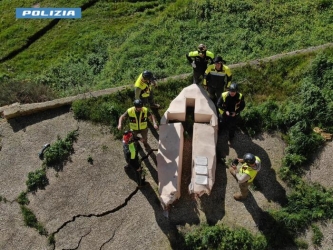In a poignant song, Elisa and Francesco De Gregori sing, "We are the ones who remain." And who knows, these young Sicilians might use it as a kind of anthem. In the scorching days of summer, they organized a festival in the heart of the least picturesque Sicily to discuss "remaining," about young people who don't want to leave and those who want to come back. The event was named "This is My Land, and I Defend It," and it took place in Campobello di Licata, near Agrigento, on August 23 and 24. It wasn't just another glamorous Sicilian summer festival but a two-day event for reflection and discussion, demanding a simple thing: the right to stay.
The location itself, Campobello di Licata, represents what Sicilians call a "paisazzo." It had around nine thousand residents according to the latest census (in 2018, there were eleven thousand), with a predominantly agricultural economy and one of the lowest average incomes in Sicily. "We could have easily chosen a more attractive location, by the sea, for example, or a tourist destination, a characteristic village, or the capital city, for our festival," says Carmelo Traina, one of the organizers, at the age of 26. "But we chose our city, Campobello di Licata because it represents, with its limits and contradictions, the average Sicilian town, with a progressive depopulation, an uncertain future, lack of infrastructure, and a very fragile economy. Talking about start-ups, high education, and smart working here is a real challenge."
"This is My Land, and I Defend It" is not just a name chosen at random. It's a tribute to a young Sicilian activist, Giuseppe Gatì. He wasn't a politician, intellectual, or influencer; he was simply "squieto," as people like him are called. Curious, willing, and organizers of events, cultural circles, and blogs. "La mia terra la difendo" (I defend my land) was the title of his blog, a place for thoughts and words in freedom. Giuseppe didn't want to leave; he decided to continue working in his father's small dairy. He was tragically electrocuted one Saturday afternoon, not realizing there was a live electrical cable. He was only twenty-four.
Today, it's his friends who organize the event in his name, to discuss rights, education, work, and to make concrete proposals. "We wanted to lay the foundations for creating a manifesto for the right to stay," says Gaetano Gatì, Giuseppe's cousin. It wasn't about self-pity; it was about bringing stories of "those who remain" to light. Like Giuseppe Lo Pilato, who transformed a waste dump into the Kolymbetra garden, a rare archaeological gem full of Mediterranean plants, next to the temples of Agrigento.
Many participated in the discussion tables, including Filippo Triolo, a 21-year-old from Salemi, in the province of Trapani. Since 2019, he has organized a literary festival, "Saliber Fest," recognized as of cultural interest even by the Ministry of Culture. "It's a battle we wholeheartedly support," he says. "This is a festival for all young Sicilians. What fashion designer Domenico Dolce says is not true. We are not lazy, and we have a strong desire to work, and we would like to do it here, in our island."
Massimo Lo Leggio, another young organizer, is clear: "The positive stories we tell demonstrate that in Sicily, and in the South in general, when there are opportunities, there are those who work for development. This is where we should start, knowing that the problem is not regional but national. The emigration of young Sicilians, furthermore, no longer primarily goes to northern Italy but mainly abroad."
From Sicily, from 2012 to 2021, two hundred thousand people have left. Gaetano Gatì is one of them; he works as a manager in a pharmaceutical company in Rome. "I had no choice," he says. But the same goes for the other young organizers of the two-day event. In Sicily, nearly a third of young people between fifteen and twenty-nine years old are part of the so-called NEETs, those who remain on the fringes of the job market. It's the highest rate in Italy, which, in turn, with a rate close to twenty percent, surpasses the European average (11.7 percent) by about eight points. "On the first day, we expected two hundred people at the work tables: we set up the courtyard of the oratory. Five hundred people showed up; we didn't know where to put them," says Carmelo Traina with enthusiasm. "Many themes were discussed, and many experiences were shared. Thousands of people in the square, in Campobello di Licata, talking about the right to stay. We couldn't believe it ourselves."
Lorenzo Farruggio, from Canicattì, quickly summarizes the themes that will be included in the manifesto: "On one hand, we have noticed the underutilization of many potentials in the island. On the other hand, we believe that it's necessary to focus on digital. In this sense, Sicily, especially in the inland areas, is lagging behind. Among all the dossiers, the most urgent one concerns infrastructure. It's hard to think of establishing new businesses in these conditions. And then, a great effort of imagination is needed, a flaw that the entire Sicilian political class lacks."

 Sezioni
Sezioni
















